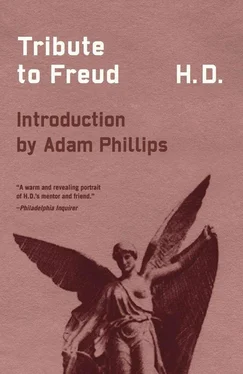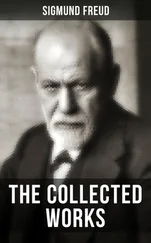I am no doubt impressed, probably not a little envious of that gifted lady, “our Princess” as the Professor calls her. I, no doubt, unconsciously covet her worldly position, her intellectual endowments, her power of translating the difficult, scholarly, beautiful German of Sigmund Freud into no doubt equally distinguished and beautiful French. I cannot compete with her. Consciously, I do not feel any desire to do so. But unconsciously, I probably wish to be another equal factor or have equal power of benefiting and protecting the Professor. I am also concerned, though I do not openly admit this, about the Professor’s attitude to a future life. One day, I was deeply distressed when the Professor spoke to me about his grandchildren — what would become of them? He asked me that, as if the future of his immediate family were the only future to be considered. There was, of course, the perfectly secured future of his own work, his books. But there was a more imminent, a more immediate future to consider. It worried me to feel that he had no idea — it seemed impossible — really no idea that he would “wake up” when he shed the frail locust-husk of his years, and find himself alive.
I did not say this to him. I did not really realize how deeply it concerned me. It was a fact, but a fact that I had not personally or concretely resolved. I had accepted as part of my racial, my religious inheritance, the abstract idea of immortality, of the personal soul’s existence in some form or other, after it has shed the outworn or outgrown body. The Chambered Nautilus of the New England poet, Oliver Wendell Holmes, had been a great favorite of mine as a school girl; I did not think of the poem then, but its meters echo in my head now as I write this. Till thou at length art free, the last stanza ends, Leaving thine outgrown shell by life’s unresting sea! And Build thee more stately mansions, O my soul is another line, and with the Professor, I did feel that I had reached the high-water mark of achievement; I mean, I felt that to meet him at forty-seven, and to be accepted by him as analysand or student, seemed to crown all my other personal contacts and relationships, justify all the spiral-like meanderings of my mind and body. I had come home, in fact. And another poem comes inevitably to prompt me:
On desperate seas long wont to roam,
Thy hyacinth hair, thy classic face,
Thy Naiad airs, have brought me home
To the glory that was Greece
And the grandeur that was Rome.
This is, of course, Edgar Allan Poe’s much-quoted Helen, and my mother’s name was Helen.
The Professor translated the pictures on the wall, or the picture-writing on the wall of a hotel bedroom in Corfu, the Greek Ionian island, that I saw projected there in the spring of 1920, as a desire for union with my mother. I was physically in Greece, in Hellas (Helen). I had come home to the glory that was Greece. Perhaps my trip to Greece, that spring, might have been interpreted as a flight from reality. Perhaps my experiences there might be translated as another flight — from a flight. There were wings anyway. I may say that never before and never since have I had an experience of this kind. I saw a dim shape forming on the wall between the foot of the bed and the wash-stand. It was late afternoon; the wall was a dull, mat ochre. I thought, at first, it was sunlight flickering from the shadows cast from or across the orange trees in full leaf and fruit and flower outside the bedroom window. But I realized instantly that our side of the house was already in early shadow. The pictures on the wall were like colorless transfers or ’calcomanias, as we pretentiously called them as children. The first was head and shoulders, three-quarter face, no marked features, a stencil or stamp of a soldier or airman, but the figure was dim light on shadow, not shadow on light. It was a silhouette cut of light, not shadow, and so impersonal it might have been anyone, of almost any country. And yet there was a distinctly familiar line about the head with the visored cap; immediately it was somebody, unidentified indeed, yet suggesting a question — dead brother? lost friend?
Then there was the conventional outline of a goblet or cup, actually suggesting the mystic chalice, but it was the familiar goblet shape we all know, with round base and glass-stem. This chalice is as large as the head of the soldier, or rather it simply takes up the same amount of space, as if they were both formal patterns stamped on picture cards, or even (now that I think of it) on playing cards. I have said, with the Professor, that I would lay my cards on the table. These were those cards; so far, two of them. The third follows at once or I now perceive it. It is a simple design in perspective, at least suggesting perspective after the other two flat patterns. It is a circle or two circles, the base the larger of the two; it is joined by three lines, not flat as I say but in perspective, a simple object to draw, once the idea of tilting the planes to give the idea of space is understood. And this object is so simple yet so homely that I think again, “It’s a shadow thrown.” Actually, it could not have been, as this shadow was, “light”; but the exact replica of this pattern was set on the upper shelf of the old-fashioned wash-stand, along with toothbrush-mug, soap-dish, and those various oddments. It was exactly the stand for the small spirit-lamp we had with us. ( Spirit-lamp ?) And I know that, if these objects are projected outward from my own brain, this is a neat trick, a shortcut, a pun, a sort of joke. For the three-legged lamp-stand in the miscellaneous clutter on the wash-stand is none other than our old friend, the tripod of classic Delphi. So the tripod, this venerated object of the cult of the sun god, symbol of poetry and prophecy, is linked by association with this most ordinary little metal frame that fits into the small saucepan and is used as a support for it when we boil water for that extra sustaining cup of tea upstairs in our room. The tripod then is linked in thought with something friendly and ordinary, the third or second member of my traveler’s set, used as base for the flat spirit-lamp and support for the aluminum container. The tripod now becomes all the more an object to be venerated. At any rate, there it is, the third of my cards on the table.
So far, so good — or so far, so dangerous, so abnormal a “symptom.” The writing, at least, is consistent. It is composed by the same person, it is drawn or written by the same hand. Whether that hand or person is myself, projecting the images as a sign, a warning or a guiding sign-post from my own subconcious mind, or whether they are projected from outside — they are at least clear enough, abstract and yet at the same time related to images of our ordinary time and space. But here I pause or the hand pauses — it is as if there were a slight question as to the conclusion or direction of the symbols. I mean, it was as if a painter had stepped back from a canvas the better to regard the composition of the picture, or a musician had paused at the music-stand, perhaps for a moment, in doubt as to whether he would continue his theme, or wondering perhaps in a more practical manner if he could himself turn the page on the stand before him without interrupting the flow of the music. That is in myself too — a wonder as to the seemliness, or the safety even, of continuing this experience or this experiment. For my head, although it cannot have taken very long in clock-time for these pictures to form there, is already warning me that this is an unusual dimension, an unusual way to think, that my brain or mind may not be equal to the occasion. Perhaps in that sense the Professor was right (actually, he was always right, though we sometimes translated our thoughts into different languages or mediums). But there I am seated on the old-fashioned Victorian sofa in the Greek island hotel bedroom, and here I am reclining on the couch in the Professor’s room, telling him this, and here again am I, ten years later, seated at my desk in my own room in London. But there is no clock-time, though we are fastidiously concerned with time and with a formal handling of a subject which has no racial and no time-barriers. Here is this hieroglyph of the unconscious or subconscious of the Professor’s discovery and life-study, the hieroglyph actually in operation before our very eyes. But it is no easy matter to sustain this mood, this “symptom” or this inspiration.
Читать дальше











